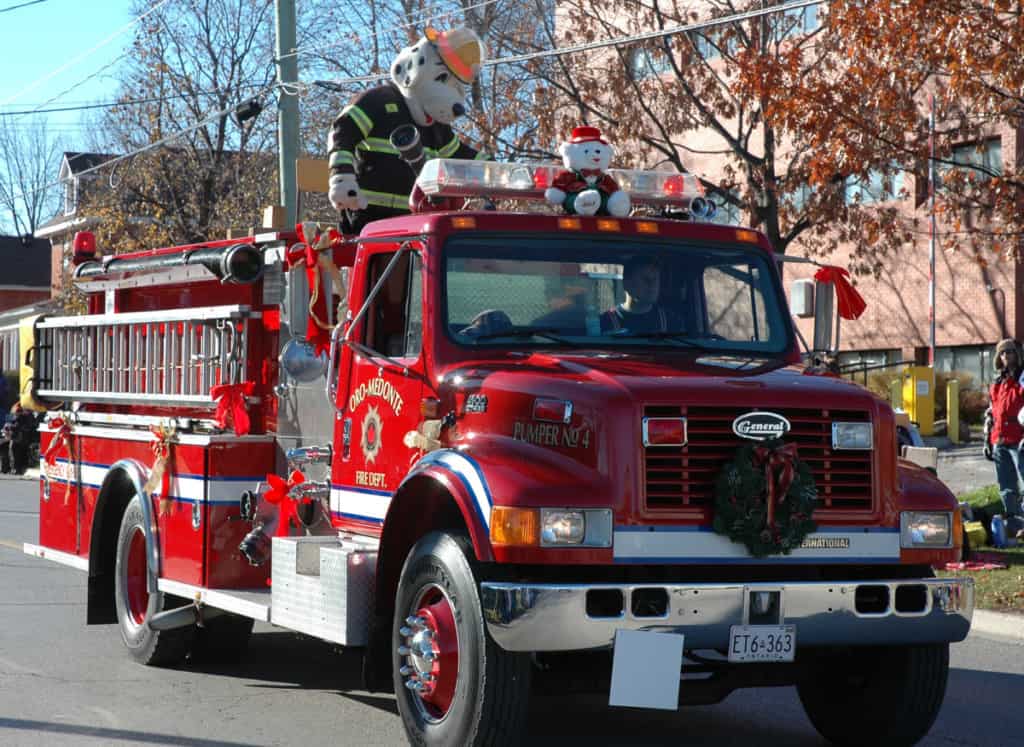Many EMTs find that after a few years on the ambulance that they want a change of scene. They don’t want to give up their skillset, but they just want to be able to apply those skills in a different way. The good news is that there are plenty of opportunities for EMT qualified professionals and we’ve rounded up the best of them for you.
With an EMT certification, you can be a firefighter, industrial medic, offshore medic, emergency dispatcher, emergency room technician, or contract medic. With some more training, you can be a biological technician, crime lab technician, health information technician, surgical technologist, physician’s assistant.
EMTs can find other job paths aside from working on an ambulance. Here’s what you need to know about landing that dream career.
Your # 1 priority is keeping your family safe. As a firefighter, I recommend everyone has updated smoke detectors that don’t require battery changes, like these ones from Kidde, a fire extinguisher, like this one from Amerex, and a fire escape ladder if you have bedrooms above the first floor, I recommend this one from Hausse.
Also read: Why Become An EMT? Is It The Right Job For You?
11 Jobs You Can Get With An EMT Certification
OK, so here are 11 jobs that your EMT certification can open the doors to.
Some of these career paths may require further training and education before you can apply, but they are jobs where an EMT license is seen as an asset, and the skills you have will be useful.
We’ve also summed up where you can find these jobs and, importantly, some roughly hourly rates and salary rates.
Note: We would like to point out that rates can vary dramatically between employers, geographic regions, etc. and they are intended to be a starting point rather than a definitive guide to compensation. Some areas or companies will pay considerably more or less than the average, so take that into account.
Also read: How Long Does It Take to Become an EMT?
1. Firefighter

Firefighters are no longer just responsible for putting out fires (in most areas). In fact, an average of 65% or more of the calls firefighters run are for emergency medical service (EMS).
For this reason, most firefighters these days are required to be EMTs and sometimes paramedics. An EMT cert and experience can be a great asset to help you get hired as a firefighter. Though you also need to be ready and willing to perform the other roles expected of firefighters (fire suppression, rescue, HazMat, fire alarms, etc.).
You will obviously need some additional training past EMT to be a firefighter, but many times this training is provided in the fire academy after you get hired.
Typically, this pays around $23 an hour or $47,500 a year if salaried.
For a shortcut to getting hired as a firefighter, check out TopScore Firefighter Coaching. It is the one thing you can do to speed up the time to getting your dream job more than any other.
Also read:
- Can Firefighters Make 100k Per Year?
- 7 Reasons Firefighters Show Up At Medical Emergencies
- How Hard is the Fire Academy? Are You Ready?
2. Industrial Medic
Basically, this is the same job as you already do as an EMT but based inside a factor. Typically, massive factories where injuries and illnesses are regular occupational hazards.
You will only need a basic-EMT certification to get into this kind of work, but a paramedic’s qualification can enhance your earnings and employment prospects.
You carry out EMT work but only with people who work for the company. As you might expect, you find this kind of work in factories or industrial centers.
Typically, this pays around $24 an hour or $48,000 a year if salaried.
3. Offshore Medic
Again, the same job as you currently do, but an offshore medic works on an oil rig. Don’t be fooled though – this is hard work, but it is better compensated than most EMT work.
Shifts tend to be 12-hours on, 12-hours off and may last for 3 months at a time! However, for every week on the rig, you will get another onshore with nothing but free time on your hands. Having a paramedic or nursing qualification can result in higher salaries and easier job hunting.
Typically, this pays around $33 an hour or $70,000 a year if salaried.
4. Emergency Dispatcher

Well, this is the job that’s on the other end of the line when you’re working as an EMT. A dispatcher’s work is to handle 911 calls and then to allocate the resulting work to the right people to handle the current emergency.
The biggest skill involved is timely information gathering and you should find you have a natural advantage as an EMT as you will know exactly what kind of information you need to get. This work is available either from individual services or from networked communications hubs serving all services.
Typically, this pays around $20 an hour or $41,000 a year if salaried.
5. Emergency Room Technician
An EMT works outside of a hospital but their counterpart in an emergency room is the ERT. So, the biggest difference in the work is that when you’re in an ERT – the patients will come to you rather than the other way around.
You can find this sort of work in an emergency room in the country and your EMT certificate should be considered the equivalent of an ERT certificate, so need to go back to college for this.
Typically, this pays around $31 an hour or $64,000 a year if salaried.
6. Contract Medic
Not every company needs medics all the time, but many need them at certain times of the year (think concert venues or cruise ships) and then they hire medics on a contract basis for that period.
The good news is that this tends to pay more than ordinary EMT work and it may result in fewer periods of activity, but the bad news is that you need to keep finding additional contracts. You will find specialist employment agencies that deal with these sorts of roles.
Typically, this pays around $28 an hour or $59,000 a year if salaried.
7. Biological Technician
Biological technicians are highly-skilled research assistants – they work to develop predictive models as well as new forms of medical action to help others. Their major role is to conduct laboratory tests and collect samples from individuals involved in the research.
Your EMT certification can help you land this job and there are no other minimum requirements, though a degree can help improve your chances. You find this kind of work in hospitals, universities, and other research facilities.
Typically, this pays around $24 an hour or $50,000 a year if salaried.
8. Crime Lab Technician

It’s fair to say that you will probably need a degree as well as an EMT certification for this job (though it’s not mandatory to be a graduate). Crime labs love to hire EMTs because they have experience in dealing with people, as well as working out the risks associated with certain kinds of work.
Much of this work is lab-based and involves employing testing methodologies to derive evidence (or the lack thereof) for the police and other law enforcement agencies. You find this sort of work in labs and hospitals.
Typically, this pays about $38 an hour or $80,000 a year if salaried.
9. Health Information Technician
A health information technician is an administrative staff member that organizes and analyzes patient information.
This can be for billing to insurance reasons and there is a great demand for EMTs in this field because of their familiarity with the language and medical terminology. You can find this sort of work wherever medicine is being practiced (including clinics, surgeries, hospitals, etc.)
Typically, this pays around $22 an hour or $48,000 a year if salaried.
10. Surgical Technologist

Now, it’s fair to say that you will need to qualify as a surgical technologist but there’s a lot of common ground with the EMT certification, so, it ought to be quite a quick and smooth process.
Surgical technologists assist the surgical team during surgery and help with basic patient care and administration too. As you’d expect the majority of jobs for surgical technologists are found in hospitals as that’s where surgery tends to take place.
Typically, this pays around $24 an hour or $50,000 a year if salaried.
11. Physician’s Assistant
An EMT qualification is very useful in this role, but you will also need a post-graduate qualification to secure the role of physician’s assistant and this usually takes about 3 years.
As it sounds, this job involves being a direct assistant for a physician and may even require taking on the physician’s role if they are unable or unavailable to carry out their duties. The majority of these jobs are available in hospitals or clinics and they pay very well, indeed.
Typically, this pays around $53 an hour or $108,000 a year if salaried.
This video talks about some other career options for EMTs and Paramedics:
Do EMTs Make Good Money?
It’s not for us to define “good money” but an EMT working on an ambulance can typically earn from about $33,000 a year to $51,000 at the highest end.
Though, it’s worth noting that ambulance services typically pay lower rates and local government and private hospitals tend to pay a bit more.
Also read: Can You Live Off an EMT/Paramedic Salary?
Do EMTs Get Paid Overtime?
Yes, as set out by the standards in the Fair Labor Standards Act (FLSA) they are entitled to overtime and this should be paid at 1.5 x their normal rate.
Sadly, many employers don’t meet their obligations on this front and you may need to take legal action in order to get fairly compensated in some EMT roles.
Also read: The Difficulty of EMT School: Is It That Hard to Pass?
Conclusion
What jobs can you get with an EMT certification? As you can see, there are plenty of opportunities for EMT qualified individuals to find other work. You don’t have to give up your skills and learning because you want a change of scene and, in fact, you may find that you end up carrying out a very similar role but in a different location or with a different focus.
You may even find that you can arrange for a better salary or hourly rate if you play your cards right. You should always check to find out what the going rate is in your area because the guideline figures may not accurately reflect the rates paid by the opportunities that are open to you.
Related Articles:
How to Become an EMT: Expert Guide
7 Reasons Why EMTs and Paramedics Are Important?
What Shifts Do EMTs/Paramedics Work? Schedules Examined

